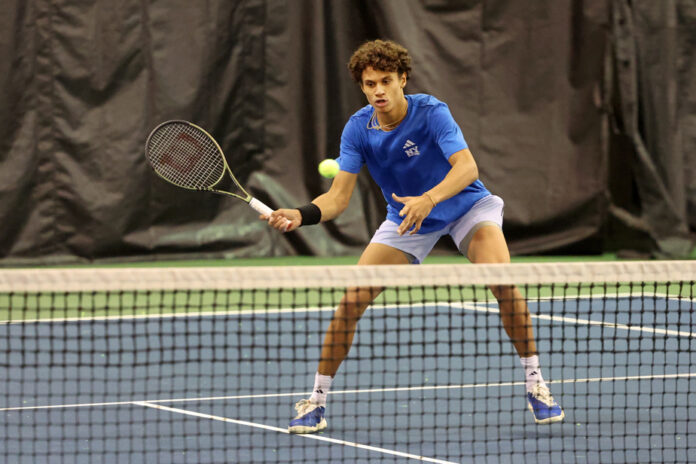“There is a tempo with which each player feels most comfortable,” explains Gabriel Diallo, banging on one of the tables in the national center’s dining room with his knuckles to create a melody.
Diallo let La Presse attend training before starting the last tournaments of his season. Seeing the world’s 136th racket up close was quite eye-opening. First, for the violence of each contact. But especially for music that emanates from a high-intensity exchange.
Among amateurs, the sound of a ball is minimal. As if we had turned the sound from stereo to its lowest setting. However, with players of this caliber, the sound is accentuated exponentially. As if the racket handle was plugged into an amp. And this rhythm serves as a benchmark during the match. Like the sound of a metronome in the ears of a drummer on the evening of a rock concert.
“When you hit a half-volley, you always try to make the sound be tok-tok, tok-tok, tok-tok,” Diallo says without pause between the two syllables while reproducing the cadence with his hands on the surface of the table.
“You don’t want there to be a gap or too much time between the bounce and the shot. »
Music lover, piano player in his spare time and recurring consumer of Frank Ocean’s album Blond, Diallo continues, explaining the change of rhythm in the background.
“You always try to hit the ball at its peak. This is not obvious. Usually the ball bounces and it’s like tok-click…tok-click…tok-click…”, alternating between touching his knuckles and snapping his fingers, to reproduce the sound of the surface. He especially emphasizes the slight space between the two sounds.
“Some like it to be a little closer to the line, others like it to be a little further, but tempo helps a lot to keep your rhythm,” he continues in the same vein.
Like in a show, beating time becomes a benchmark to hold on to. “Especially when it’s a little more tense moments in a match, at the end of the innings where you’re trying to get back to the basics and keep it super simple,” said the 22-year-old.
Diallo is preparing to defend the Canadian title acquired at the Davis Cup last year. It is difficult to predict what his role will be within the national team, but notwithstanding his possible contribution, he draws a positive assessment of his first season in the professional ranks.
And his time at the National Bank Open in Toronto was also very educational. He notably beat Daniel Evans, 21st player in the world at the time. And he was combative against Alex de Minaur, possible finalist of the event.
“The progress is still obvious,” admits Diallo. He is delighted to have been able to turn some difficulties into ammunition. “My serve wasn’t a deficiency, but let’s just say it was a little one-dimensional. He wasn’t as consistent as I wanted. I return much better. Especially in return from the forehand. I go to the net more too. »
More importantly, Diallo has made a name for himself this season. Maybe he’s not yet feared by everyone, but his name certainly resonates a lot more.
And he is especially proud to know that his family name can travel. May it be written in capital letters in tournaments around the world and used to encourage it. Because Diallo is defined much more by his last name than by his first name.
“A lot of pride, especially for my father’s side,” he says with a frank smile.
He speaks of his father as a man who got up to go to work in a computer factory at 5 a.m. all his life and came home exhausted at 5 p.m. “Sometimes I didn’t see him for three or four evenings, because as soon as he came home from work, he went to sleep. »
The Diallos never went on vacation together. “We sometimes went to Sandbanks to go camping, but we never did any big trips. »
He visited Europe for the first time last year and Asia this year thanks to tennis. “As a junior, I only stayed in North America. »
He also had to get used to this new reality.
But in the meantime, this son of immigrants from Guinea and Ukraine has benefited from his parents’ sacrifices. He has too much respect for them to even pretend to be able to return the favor, but he at least strives to make them as proud as possible.
But they chose the tennis path for their offspring. Her goal now is to take advantage of the luck that her parents were never able to benefit from.
“What I do, compared to what my parents did, is just a bonus. […] I think my father is proud. And ultimately, that’s my goal, to make my parents as proud as possible. »















